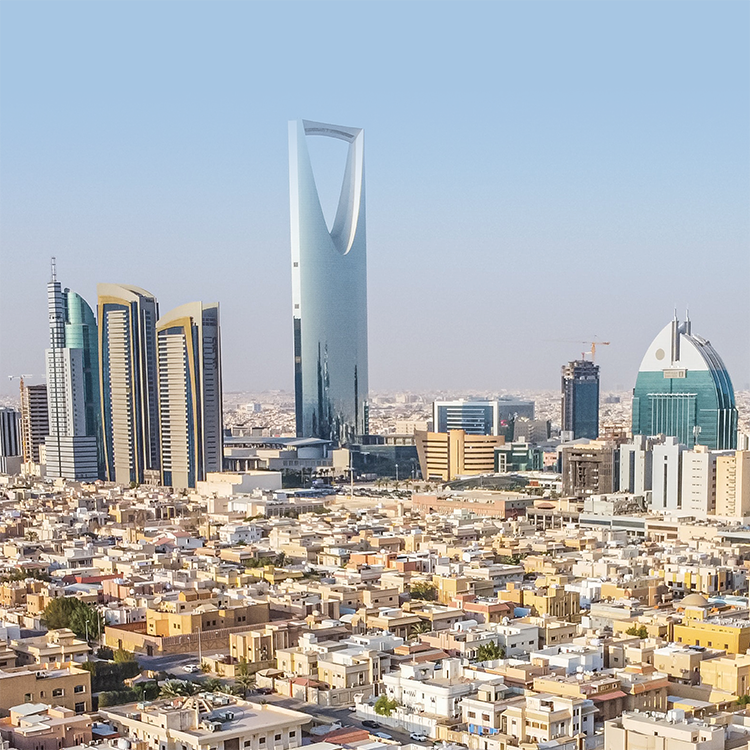Significant opportunity exists for Australian businesspeople in Saudi Arabia, as it undergoes extensive economic and social transformation under its “Vision 2030” diversification plan.
Vision 2030, which aims to diversify the economy away from oil, requires large injections of foreign investment, knowledge transfer and skilled professionals. Accordingly, the Saudi market holds an abundance of opportunity for Australian exporters, especially in the infrastructure, mining, agrifood and education sectors. Our two-way goods and services trade in 2019-20 was nearly AU$1.9 billion, with strong potential for future growth.
Economy and business environment
Despite global uncertainty related to Covid-19, the Saudi economy and business environment are expected to progressively improve in 2021. The IMF projects the Saudi economy will grow by 2.1 per cent in 2021.
Reforms to contract, business and labour laws, the banking system and the Saudi capital markets in recent years have made it much easier to do business. Saudi government agencies are focused on improving regulatory frameworks to encourage trade and investment. Incentive programs exist in key sectors, including for foreign companies who establish a regional headquarters in Saudi Arabia.
Perceptions about Saudi Arabia are often dated and misleading. Reforms have made Saudi Arabia more attractive to businesspeople. These include introducing visit and residency visas, relaxing dress codes, introducing an array of entertainment options, allowing gender-mixing at a number of tourist sites and in restaurants, and opening new sectors for female employment. Australian consultants – both male and female – are afforded the opportunity to do business at a senior level with significant responsibilities, and consider that experience in Saudi Arabia would be valuable in future careers.
Opportunities
Mining, Infrastructure and Professional Services
FDI in Saudi Arabia has continued on an upwards trend, with projects associated with Vision 2030 continuing apace despite the pandemic. Saudi Arabia’s leadership wants to invest the country’s oil wealth to develop the manufacturing industry, including down-stream oil and gas, renewable energies, automotives and downstream extractives processing. The leadership has announced an infrastructure investment pipeline valued at USD 1.2 trillion.
There is strong medium to long term potential for Australian services to play a role in the realisation of Vision 2030 projects to transform the Saudi economy in infrastructure, digital systems and resources. Australian companies are currently providing consultancy work in key positions on a number of the ‘Gigaprojects’ associated with Vision 2030 – including ‘smart city’ Neom, tourism developments Amaala and the Red Sea project, and entertainment zone Qiddiya. Australian companies are being solicited by Saudi Government agencies seeking digital technology capabilities for e-government and the finance sector. Although we already have a number of Australian experts and services companies supporting the extractive sectors with the Saudi Arabian Mining Company (Ma’aden), the industry is set to grow rapidly in the coming years with new projects and will offer new opportunities.
Agrifood
Australian food products, especially meat, dairy and vegetables, have built up a strong reputation in the Saudi market. As Saudi Arabia develops its hospitality sectors, Australian products including high quality beef and lamb, have gained a foothold in this premium market.
Most recently Australia has become the largest supplier of barley to Saudi Arabia – demonstrating the importance of Saudi Arabia as a diversification market for Australian commodity exporters.
Investment
Major Saudi sovereign wealth funds are increasing their international investments. Aramco is interested in gas investments in Australia, and SALIC has invested in Australian agricultural land and is exploring further investment options. Major sovereign wealth funds are also sharpening the focus on domestic investment to build capacity in key sectors, such as health, agriculture and mining.
Education
The significant and motivated cohort of Saudi students studying in Australian higher education institutions has become the bedrock of our growing education ties. While border closures have necessitated a change in approach, with a greater focus on online and transnational education, Australian institutions are building ties with Saudi government and private sector entities to deliver high quality Australian education services.
Strong opportunity exists for Australian providers in the vocational education and training sector in Saudi Arabia to complement the investments that Australian providers have already made in the Kingdom, such as Aviation Australia College in Riyadh. Long-term investment in university education has resulted in a youthful generation of well-educated Saudis looking for professional roles, however there is a lack of trades and technical workers. Over 2 million foreign tradespeople and labourers have left Saudi Arabia since 2017, and maintaining productivity without them is a challenge for the country, which is also trying to encourage Saudis into semi-skilled jobs.
Australian Business Networks and Further Information
Useful contacts in Australia include:
Australia Saudi Business Council
Australian Arab Chamber of Commerce and Industry
There is an active Australian business and social community in Saudi Arabia, including the Australian Business Group Saudi Arabia who meet regularly outside of the summer month holiday period (and of course Covid-19 restrictions). You can register for ABGSA via Facebook or LinkedIn.
Austrade has published further information on the Saudi market, including contact details for its Riyadh office. The Australian Government regularly updates the travel advisory to Saudi Arabia.

